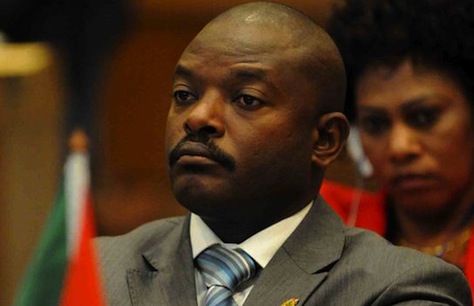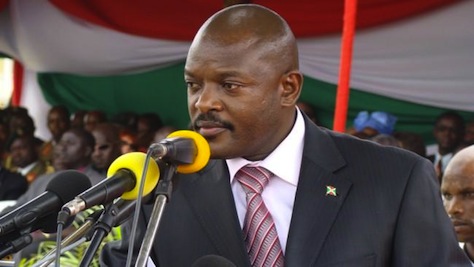
I write for The National Interest on Thursday that as the world continues remembering the 20th anniversary of the Rwandan genocide, which resulted in the deaths of 800,000 mostly Tutsi Rwandans in three harrowing months in 1994, the world is largely ignoring Rwanda’s southern neighbor, Burundi, as it slips further into a political crisis that could drag Burundi back into ethnic violence that marked its own civil war in the 1990s:
As the 2015 election approaches, however, [president Pierre] Nkurunziza (pictured above) has steamrolled the post-Arusha constitutional consensus by pushing through an election law that could allow him to run for reelection, despite growing opposition. Last year, Nkurunziza introduced a tough new law restricting press freedom amid a wider crackdown on journalists. This year has brought even more restrictions on political assembly and casual gatherings, and the imprisonment of regime opponents after a clash between protesters and the police in the capital, Bujumbura. The leading opposition figure, Alexis Sinduhije, a Tutsi and former journalist who heads the cross-ethnic Movement for Solidarity and Development coalition, was arrested earlier this spring in Belgium after fleeing Burundi, though Belgian officials subsequently released him. The government has also persecuted members of the National Forces of Liberation (FNL), the last major Hutu rebel group to sign the Arusha accords (in 2008). Numerous reports that the CNDD-FDD is arming its youth militia, the Imbonerakure, were sufficient to cause significant concern within Burundi’s UN peacekeeping force earlier this year. That’s especially chilling in light of the role that similar Hutu youth militias, known as the Interahamwe, played in the 1994 Rwandan genocide.
I add that the international community could play a role in boosting Burundi’s fortunes through greater investment:
That doesn’t mean there aren’t promising areas of development. Incredibly, Burundians have known since the 1970s that their tiny country holds at least 6 percent of the world’s nickel reserves. So far, however, those mineral deposits have gone unexploited. Investment to develop Burundi’s industrial capacity and its ability to process nickel ore would be a game-changer. So would investment to improve Burundi’s road and rail infrastructure, allowing nickel (as well as coffee, bananas and other agricultural products) to more easily reach a major port, like Dar es Salaam in Tanzania. Moreover, for a country that’s still 90 percent rural, more efficient agricultural technologies could liberate a significant part of the population for more rigorous education and, ultimately, a more broad-based, services-heavy economy. With a median age of seventeen, Burundi is one of the ten ‘youngest’ countries in the world. Therefore, improvements in education could greatly benefit its youthful population and the country’s developmental future.
But none of this can happen under the penumbra of increasing political violence or the threat of further civil war, whether it’s Hutu-against-Tutsi or Hutu-against-Hutu. Though a surge of development might ameliorate some of the worst of Burundi’s political tensions, greater political stability is a prerequisite for attracting the investment that Burundi needs to fuel that growth. As in many of Africa’s struggling states, Burundi is trapped in a tragic “catch-22.”
![]()

